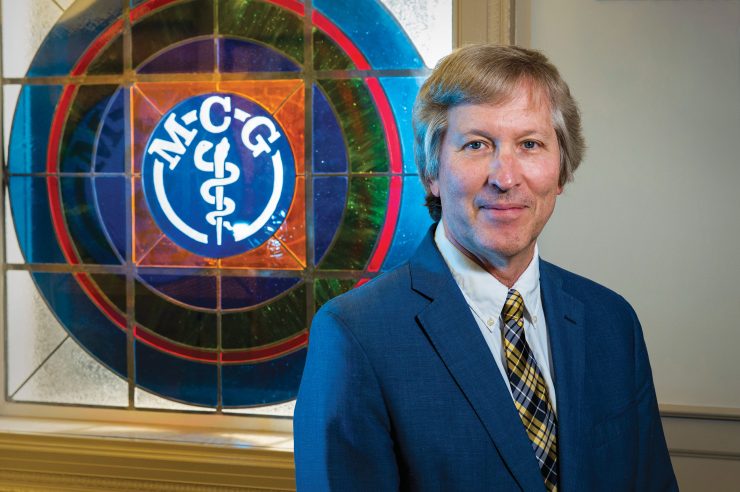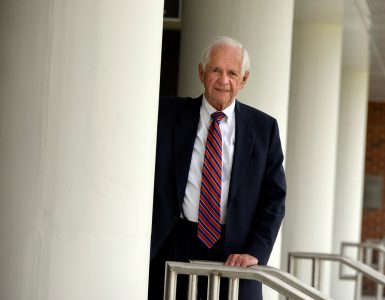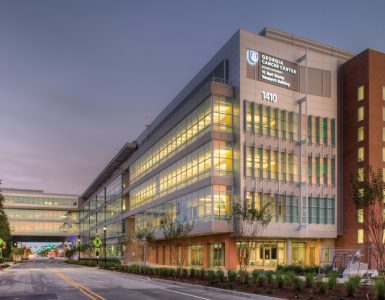I guess by nature and nurture most of us are analytical types. We like solid information and context to get a more complete understanding of what is really going on, whether it’s trying to help a patient gauge their overall health or even assess the health of our medical school. Rankings can tell part of the story, but they often lack solid context, instead putting everyone in the same pot to compare, for example, every medical school’s funding from the National Institutes of Health.
Although a medical school’s real bottom line is how good we are at educating physicians — and we have to look no further than the contributions of you, our graduates, and how well our students do in the annual Match to know that MCG is great at that — medical schools are regularly rated by their NIH funding. We tend to rank about the middle of the pack when you look at just those hard numbers.But I can tell you as someone who has been here since I came for my neurology residency in 1986, there is nothing middle of the pack about MCG. I found here in my training, my years on the faculty, including serving as neurology chair before becoming dean in 2017, that while your medical school is not perfect, the people here have a purpose and drive and distinction that is anything but average. I wanted to share some context for that when you look at those important NIH numbers.
Dr. Mark Hamrick, who we talked about when he was named our inaugural senior associate dean for research nearly a year and a half ago, has been doing a ton in the time since to help us better organize, focus and grow our research. One thing he did was look at those NIH funding numbers and when he put them in the context of how many faculty we have, which is fair, we are nowhere near the middle.
MCG actually ranks number 2 out of the 49 medical schools in the nation with less than 700 faculty members. Tulane University School of Medicine in New Orleans is number one, with not quite $2 million more than us in NIH funding, the gold standard for research funding. MCG ranks 11th in NIH funding among medical schools with less than 1,000 faculty.
As I said when Dr. Hamrick first shared these numbers with me, this is solid proof that the scientists here are as competitive and hard-working as they are anywhere.
But as the public medical school for one of our nation’s largest states, currently the eighth most populous state (number 24 if you look at our physical size), we want and need to do more. We are working to strategically grow, not to improve our ranking, although let’s be honest, those measures do count in some venues, but to enhance our impact and our education of future physicians and physician-scientists. It’s all part of that context we were talking about.
We tend to weigh in among the nation’s top 10 medical schools in terms of our class size, and as we have talked about, we are growing that class size, currently at 260, to a total of 300 students in the next few years, with an expanded emphasis on those who will serve more rural, underserved areas.
But to optimally educate current and future students, we must continue to expand the number of hard-working scientists and physicians we are privileged to call our faculty members and the scope and depth of our clinical offerings. Because ours is a business where everything we do really does affect everything else we do. And, when the most important thing we do is educate physicians, our medical school must be a place where we don’t just teach what others have taught us but where we discover new knowledge, and where the medical care we offer inspires and optimally prepares future physicians.
That means we are in the midst of strategic, concerted growth in everything we do. Sometimes it’s hard to sleep thinking about, as you would in a good chess game, the best next move and how that gets us where we want to be.
Just to give you an idea of moves we are making, some recent recruits include Dr. Qin Wang, an MD/PhD who did her postdoc work at Vanderbilt University, joined the faculty there then moved to the University of Alabama at Birmingham in 2005 where she is currently a professor in the Department of Cell, Developmental and Integrative Biology. Her research focuses on the neuropharmacology and signaling mechanisms underlying neurological and psychiatric disorders, like Alzheimer’s. Her work in animal models and human tissue is extremely translational and here she will start the Program for Alzheimer’s Therapeutics Discovery that will contribute to better solutions for this devastating condition that is increasing along with our aging population. She also will be our newest Georgia Research Alliance Eminent Scholar. Dr. Wang is a leader in her field who currently is PI on three NIH grants and contact PI on two additional multi-PI NIH grants. In fact, Dr. Wang was among the top 20 out of 869 NIH-funded PIs in the nation’s anatomy/cell biology departments in 2020 (see, here I go using NIH rankings). Not only are we fortunate enough to recruit Dr. Wang, who starts with us April 1, but her husband, Dr. Kai Jiao, also an MD/PhD, and an NIH-funded cardiovascular genomics expert at UAB’s Heflin Genetics Center and interim division director for the Division of Research in UAB’s Department of Genetics. Dr. Jiao is doing fascinating work on the other end of life’s spectrum: heart development. Dr. Jiao will be joining our Department of Medicine and Center for Biotechnology and Genomic Medicine. A definite double win for MCG.
In this magazine, you will read about our amazing new initiative in cardio-oncology, an emerging field that is looking at the collision of cardiovascular disease and cancer, our state and nation’s top two killers, which each have an even bigger impact on Black Americans. Once again, and this time under the leadership of Dr. Neal Weintraub, our chief of cardiology and another GRA Eminent Scholar, MCG overcame some strong national competition to be one of four American Heart Association-funded centers taking this on. Another very strategic hire we have made as part of this is Dr. Avirup Guha, one of the nation’s first board-certified cardio-oncologists who we recruited from Case Western and who will help patients and caregivers alike maneuver these complex waters.
Another key new recruit is Dr. Lynne Abruzzo, another MD/PhD, a hematopathologist and cytogeneticist who codirects the Cytogenetics Laboratory at The James Cancer Center at Ohio State and who will join us this summer as chair of the Department of Pathology. She has previously served on the faculty of the University of Texas MD Anderson Cancer Center where she was section chief of the Clinical Cytogenetics Laboratory, and at the University of Maryland School of Medicine, my alma mater. She is a longtime educator whose research focuses on the genetics and pathogenesis of chronic lymphocytic leukemia and other leukemias and lymphomas and looking for better diagnostic and prognostic markers. She was not someone whose bucket list included being in charge, but her experience in directing a busy cytogenetics laboratory and in working with other leaders made her seek the position of chair of our Department of Pathology as a way to now help others, and MCG, succeed.
At our magazine’s press time we were finalizing two more amazing recruits to co-direct a new Immunology Center here. I hope to have more on this for you soon, but we all know how essential our immune system is to our health, like protecting us from the COVID virus, and what a huge role it plays in common conditions like Alzheimer’s, stroke, heart disease and you name it. Like we talked about earlier, we already have great people working in immunology here, like Dr. David Munn, a 1984 MCG graduate and cancer researcher who has taken a basic science finding about one way fetuses avoid detection by the mother’s immune system, and transformed that into a therapy that may help children battling relapsed brain cancer (Spring/Summer 21 issue of MCG Medicine). So we are building on another strong foundation.
There is much more happening so please stay with us. I promise there are even greater days ahead for your medical school and we need your support to get there.
Respectfully yours,

David C. Hess, MD
Dean, Medical College of Georgia
Executive Vice President for Medical Affairs and Integration, Augusta University
Presidential Distinguished Chair









